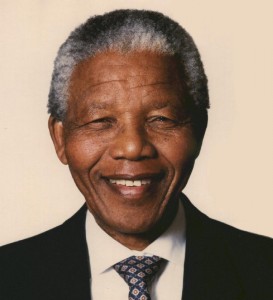 Some reports out of South Africa in recent weeks have called Nelson Mandela’s condition “critical”. The thought that we may soon lose this remarkable man has led many to comment on his impressive leadership, or on his importance in African and world history.
Some reports out of South Africa in recent weeks have called Nelson Mandela’s condition “critical”. The thought that we may soon lose this remarkable man has led many to comment on his impressive leadership, or on his importance in African and world history.
Personally, I feel as though I am losing an old friend, although I never have had the privilege of meeting Mr. Mandela. The reason I feel “close” to the former president is that I have used him as an example in hundreds of speeches and presentations throughout the world for the past fifteen years.
In fact, President Mandela is the best illustration I have ever found of one of the cornerstone concepts of my leadership coaching.
The basic notion is this: Much of society believes that those who emerge as outstanding leaders in any field have something extraordinary in their past that has somehow forged them, transformed them, and prepared them for leadership roles. In truth, it is not so much that their background or history has transformed them; it is that they have transformed themselves.
All of my study of leaders, and my coaching experience, has led me to believe that great leaders do not have extraordinary pasts. What they do have is an extraordinary ability to learn from and to use their pasts.
Many argue that a “crucible” life event or undertaking can be transformational. In the end, though, it is the individual’s reflection on the event, and not the event itself, that leads to the transformation. And, this is why I like the example of Mandela so much.
By his own account, Nelson Mandela considers his time in prison as the turning point of his life, the event that allowed him to grow into the leader he was to become. In his jail cell, he reflected as never before, about his past life, about his desire to become a better person, and about the need to eschew anger and vengefulness. He was able to achieve “the most difficult task in life…changing yourself.”
Mandela described this personal change to Oprah Winfrey in 2001: “Before I went to jail, I was active in politics as a member of South Africa’s leading organization—and I was generally busy from 7 A.M. until midnight. I never had time to sit and think. As I worked, physical and mental fatigue set in and I was unable to operate to the maximum of my intellectual ability. But in a single cell in prison, I had time to think. I had a clear view of my past and present, and I found that my past left much to be desired, both in regard to my relations with other humans and in developing personal worth.”
Thus, if his long incarceration was the defining incident of the future president’s life journey, the important part of the story was not the event of going to prison, which was a common occurrence for anti-apartheid activists at that time. Far more interesting was Mandela’s processing of the event, and his use of its lessons.
A remarkable self-transformation: Think of all the stories you may have heard or read about those who go to jail for long term sentences. Most end up feeling defeated, dejected, bitter, resentful or victimized. Few emerge as better people and positive influences in the world.
Rather than let the experience discourage or embitter him, Mandela was able to turn it positive. The work he did on himself during those prison years transformed Nelson Mandela into the man who would emerge as South Africa’s first post-apartheid president, and a worldwide symbol for justice and fairness.
While I would not contend that everyone should strive to lead on the grand scale of a Nelson Mandela, I often say that the people I coach and teach can learn from his example. Through lifelong learning and reflection on our own life experience, each of us can transform ourselves into people of greater influence in our organizations and our worlds.
